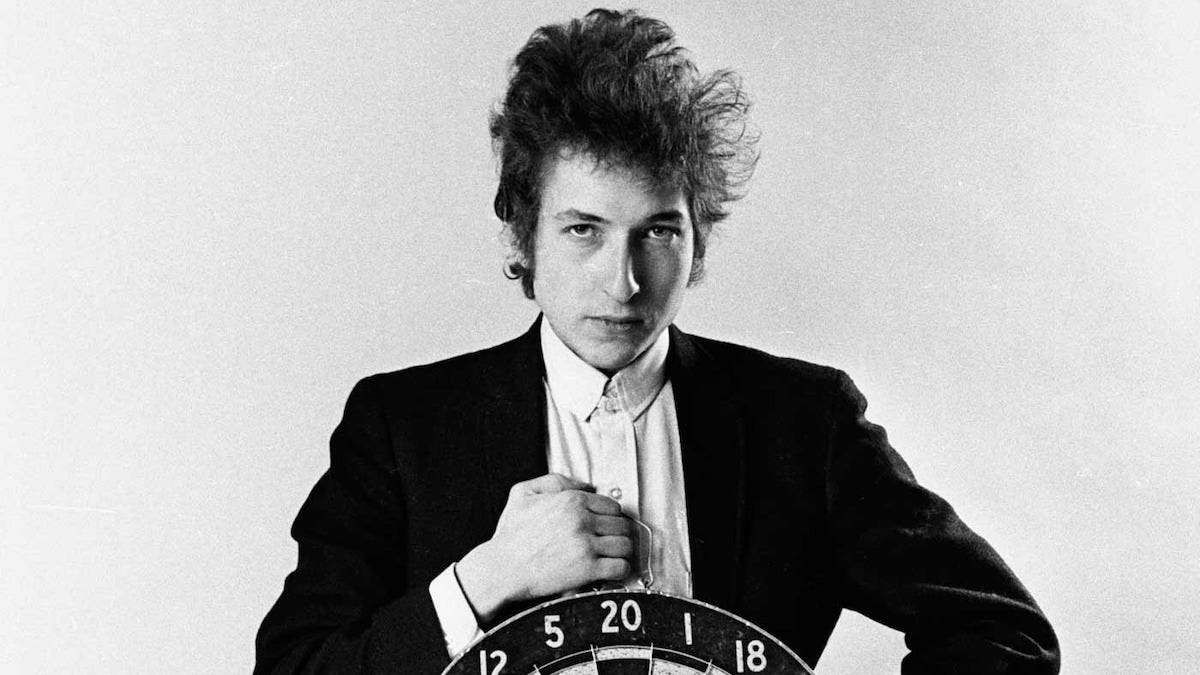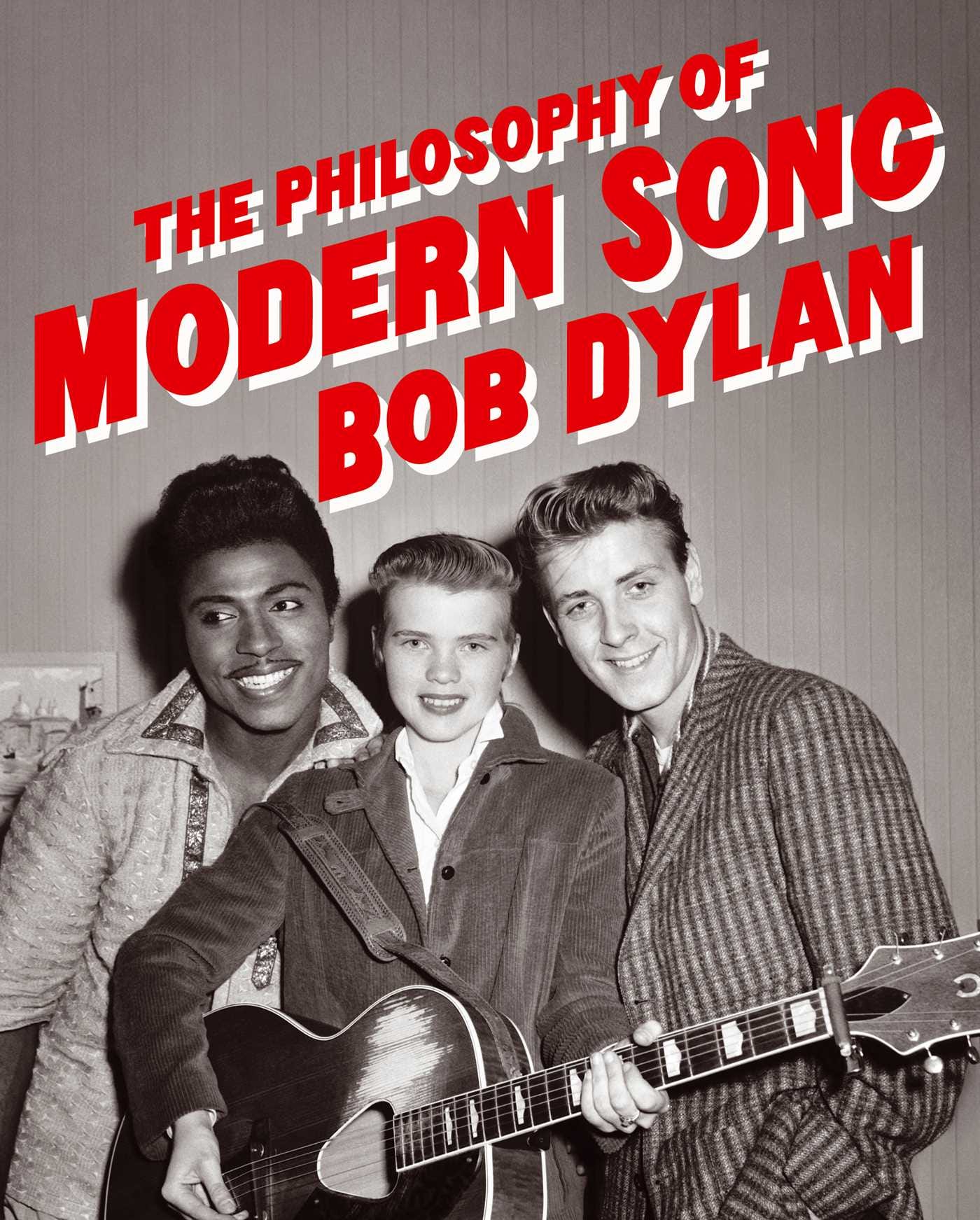Reading Is Fundamental: Bob Dylan writes 66 highly imaginative record reviews in The Philosophy Of Modern Song
If this master songwriter/rock ‘n’ roll icon thing doesn’t work out, he’s got a bright future as a music journalist.
Howdy, friends and neighbors. Before we dig into one of 2022’s most highly anticipated books, can I ask one favor? Can you please stop talking shit about Madonna’s many plastic surgeries, which were highly evident at the Grammys?
I know, I know. You’re offended in extremis. I know this, because you can’t stop posting about it on social media. But let me ask you this: Are you Madonna’s boss? Or her parent?
For that matter, isn’t she a fully grown, independent, wealthy-as-hell adult, fully capable of making her own damned decisions, whether you like them or not?
And by the way, do you think she gives a good goddamn what you think about what she does with her life? But hey, large chunks of y’all think you can tell a woman all day long what she can and cannot do with her body. So, of course you think you can tell Madonna what she can do with her face.
Oh, but wait. THIS WEEK, you’re outraged that Rhianna played the Super Bowl Half-Time Show!
*sighs* *rolls eyes*
WTF, people. Are you upset it isn’t Aerosmith again? Or that hot-rocking Matchbox 20?!
“I don’t know these songs.” What? Are you that old and white?
BTW, was your remote missing? Did its batteries run out? Ever hear of CHANGING THE FUCKING CHANNEL?!
And again, WHY DO WE ALL HAVE TO HEAR ABOUT IT?! REPEATEDLY?! ALL FUCKING WEEK LONG?!
I mean, I am beginning to wonder if some of you actually like anything! All I see is shitposts all day long, about all these things you hate. It’d be kinda swell to hear about things you enjoy for a change. Maybe you enjoy fishing, or turkey pot pies, I dunno. Let us hear about it.
Then again, I suppose I am doing exactly what you do, complaining about your negativity here. And like Madonna’s face and Rhinna’s very pregnant belly and what these ladies choose to do with them, it’s none of my business how you run your social media. And I know how to scroll. I just wonder if you know how to advocate for something, rather than tear it down. It would make social media a more enjoyable experience, for sure.
So, here’s something I enjoyed. Which, predictably, got panned by a rash of younger critics, for all the wrong reasons.
BOB DYLAN – The Philosophy Of Modern Song (2022, Simon & Schuster, New York, 340 pages)
Amazon announced last spring Bob Dylan would be publishing a new book come November 2022, and it would essentially be a masterclass in songwriting from – let’s face it – someone who knows a thing or two on the subject. I’m certain I wasn’t the only one who told Amazon, “Just take my credit card! NOW!” Judging by the overtly snide reviews from pundits young enough to be Dylan’s great-great grandchildren, that was not the thought process of a generation that believes songs are supposed to be composed by committees, until the dais at any given contemporary Grammy Awards show buckles under 32 pairs of feet accepting Song Of The Year trophies.
“How can this be about ‘modern song,’ when there are no Billie Eilish songs in here?”
“This isn’t inclusive enough! Where are the women?! He’s clearly a misogynist!”
Well, for one thing, this is Bob Dylan’s book, not yours’. He does not have to include anything contemporary if he does not want to.
Secondly, of the 66 songs he writes about (playlist above), seven are written by female composers or co-composers. This is a book of essays on a very personal selection of songs he likes. Is he supposed to include a bunch of tunes he may not enjoy, to fit your criteria of what’s contemporary, or to be “more inclusive?”
Bob Dylan wrote “Like A Rolling Stone.” He wrote “It Ain’t Me, Babe,” “The Times They Are Changing,” “Mr. Tambourine Man,” “It’s All Over, Baby Blue,” “Knocking On Heaven’s Door,” “Subterranean Homesick Blues,” “Girl From The North Country,” “All Along The Watchtower,” and hundreds of other paragons of poetic and melodic invention. You did not. Alongside Hank Williams, he is one of the greatest performing songwriters of the 20th Century. You’re not, and never will be. This is his book, not yours’. When you write your book, you can include all the Billie Eilish tunes you want. And until you write a song a tenth as great as even one of these songs just named or not, you can kindly shut the fuck up and not tell Bob Dylan how to write a goddamned thing.
Then you have artists complaining that Dylan did not include them, or favored someone else. Such as a member of the Talking Heads who was upset over Dylan’s declaration that Elvis Costello And The Attractions were the best band of their generation, rather than the Talking Heads.
Can you hear my eyes rolling from wherever you’re reading this?
As an author, Dylan’s batting average hasn’t always been keen. His first book, Tarantula, was essentially a series of lysergic, impressionistic prose-poems that seemed like extensions of the absurdist lyrics he was stapling to the overamped blues rock he’d fully embraced in that time. Only it didn’t work as well without the jagged Fender lines and Hammond B-3 washes that hallmarked his mid-Sixties music. Chronicles, Vol. One was more like it, scattershot memoirs following no linear chronology that still left cynics feeling he’d revealed nothing. Guess dropping clues as to the sources and influences that have been woven through his craft is nothing. *shrugs*
The Philosophy Of Modern Song will appease no one disappointed in Dylan’s first two books. But he could write the 21st Century's War And Peace and those critics would still be unhappy. All that aside, it might be the last book the 81-year-old will write. And if Chronicles edges out Philosophy as his best book, it’s not by much.
Basically, this amounts to 66 highly imaginative record reviews, covering country (and lots of it), blues, rockabilly, and old rock ‘n’ roll. There’s ancient folk songs, even Tin Pan Alley standards from what now gets called The Great American Songbook. Only a couple of tunes come from the punk world – Costello’s “Pump It Up” and The Clash’s “London Calling.” For the most part, each chapter – one per song – is divided into two different pieces of writing from Dylan. The first part contains a poetic interpretation of the lyric. The second half is a philosophical essay, using the song as a springboard for Dylan’s musings on different aspects of the modern world or history, sometimes encompassing a potted biography of the artist, even discussion of the art and craft of songwriting, much as the pre-release hype promised. The language employed – an amalgam of hardboiled detective fiction and The Bible – lets you know this is Bob Dylan writing.
It’s hard to tell which writing mode is better. Let’s take one song for our example, “Pump It Up.” The prose poem portion offers at one point, “You live in a world of romance and rubble, and you roam the streets at all hours of the night. You’ve acquired things and brought people the goods.
“It’s not like you have a promising future. You’re the alienated hero who's been taken for a ride by a quick-witted little hellcat, the hot-blooded sex starved wench that you depended on so much, who failed you. You thought she was heaven and life everlasting, but she was just strong-willed and determined – turned you into a synthetic and unscrupulous person. Now you’ve come to the place where you’re going to blow things up, puncture it, shoot it down.”
Then the philosophical essay careens recklessly, all over the damned road: “You couldn’t say that (Costello) didn’t remind you of Buddy Holly. At least on the surface. Elvis had Harold Lloyd in his DNA as well. At the point of ‘Pump It Up,’ he obviously had been listening to Springsteen too much. But he also had a heavy dose of ‘Subterranean Homesick Blues.’ ‘Pump It Up’ is a quasi-stop-time tune with powerful rhetoric, and with all this, Elvis exuded nothing but high-level belligerence. He was belligerent in every way. Even down to the look of his eyes. A typical Englishman or Irishman, didn’t matter how much squalor he lived in, always appeared in a suit and tie.”
Well, now. If this master songwriter/rock ‘n’ roll icon thing doesn’t work out, Bob Dylan has a bright future as a music critic.
All in all, Philosophy feels like a literary version of his old Theme Time Radio Hour. That “my fishing buddy” Eddie Gorodetsky, the producer of that satellite radio fixture from this century’s first decade, nets a special thanks “for all the input and excellent source material” suggests there’s at least a grain of truth to that observation. The book’s dedication just above that credit, to vintage rock ‘n’ roll/r&b songsmith Doc Pomus, speaks equal volumes. The Philosophy Of Modern Song may not be the book you wanted. And it’s certainly not the book I expected. But it may be exactly the book we need nowadays, right down its striking graphic design offering a peek at a world long gone, a better world than the one we inhabit. Philosophy is a door to that world. Something tells me I will be opening it often.
Still running that “I beat COVID!” one-year subscription special!
Just a reminder that I am extending the 70% discounted year’s subscription offer until Friday. Take advantage – you can’t find a better deal than 12 months behind the paywall for $27! So, click all this blue underlined mess above! Maybe you can read tomorrow’s installment of that Keith Morris interview?
#timstegall #timnapalmstegall #timnapalmstegallsubstack #punkjournalism #readingisfudamental #bookreview #bobdylan #thephilosophyofmodernsong #thirdbook #sixtysongs #basicallyrecordreviews #prosepoems #criticalessays #punkrock #punkculture #rocknroll #subscribe #readersupported #seventypercentoffoneyearsub


